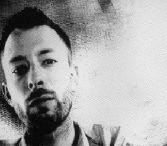FORGET WHAT YOU HEAR from the cognoscenti and cultural analysts: Rock doesn’t need any saviors, and Radiohead’s not qualified for the job anyway. Thom Yorke, Jon and Colin Greenwood, Ed O’Brien, and Phil Selway earned “Great (Blank) Hope” expectations after 1997’s OK Computer, a splendid album that, in the tradition of the best records of the ’70s, contained four or five awe-inspiring cuts and damn good filler to boot. It was close to brilliant, it sold a million copies in America without a radio hit, but it hardly presaged the future of rock—although every rock band subsequently yearned to secure producer Nigel Godrich.
Radiohead
Kid A (Capitol)
Let’s get the visionary thing out of the way before we even discuss what’s become officially known as “the long-awaited follow-up,” Kid A. Way back in 1993, years before Radiohead ensconced themselves in the heart and canon of the Intelligent Rock Fan, they teetered like any other Brit band trying to make it in America, entering the lottery on the strength of a jittery, accidental hit, “Creep,” that surfaced in the waning days of MTV-as-music-television and that wasn’t much more artful than the average Mudhoney song.
Our attention spans must’ve stretched more generously back then, because two years after “Creep” came and went, Radiohead returned with The Bends, a sophisticated disc that showcased the band’s unorthodox three-guitar lineup. It featured the best pop song they’ve ever written, “High and Dry,” it hinted at their blossoming union of offbeat topics with conventionally beautiful music (“Fake Plastic Trees,” “My Iron Lung”), and it fared well enough commercially to launch the boys past their sophomore slump without getting ’em tossed from their US label.
Then came OK Computer, which only three years after its release already yields the sort of cachet reserved for venerable pop masterpieces like Warhol’s soup cans or Soderbergh’s Sex, Lies, and Videotape. Like those works, Radiohead’s achievement influences and will continue to influence bands for decades to come (fellow Brits Travis already pledge allegiance, while another comparable disc is on the way next month from Coldplay). OK Computer‘s implied and specific theme of man adapting to and converging with technology—a theme that Radiohead vehemently denied, as if they were Led Zeppelin battling ministers on the subject of Satanic messages—was hardly revelatory in 1997.
SO THREE YEARS have passed since Radiohead’s moment atop rock’s heap, and the band has taunted fans with a dour documentary about Touring Stress Disorder ironically titled Meeting People Is Easy. Godrich produced Pavement. Yorke entertained offers to collaborate, agreeing to unlikely projects such as the celebrity electronic jamboree U.N.K.L.E. and a duet with Isobel Monteiro of the British band Drugstore, with whom he recorded a 1998 song with the felonious chorus “Let’s kill the President,” which prevented it from denting US radio charts.
Now, finally, after rumors spread by Napster users and the few journalists deemed enlightened enough to experience advance recordings, we can hear for ourselves whether Radiohead really recorded an album with “no guitars,” whether they’ve upgraded their degrees from Masters of Rock to PhDs of modern music.
Kid A starts off like a Laurie Anderson remix: There’s an obscenely warm organ sound juxtaposed against cut-up vocal samples. It’s instantly moody, and there’s no party lurking within the next nine tracks. Andre Breton claimed that Flaubert’s mission with Madame Bovary was “to do something that would have the color of those mouldy cornices that harbor wood lice.” If Radiohead’s previous achievement was to craft a musical equivalent to those simultaneously gloomy and hope-filled moments before sunrise, then they’ve moved indoors and taken to fiddling with the dimmers and thermostats.
Electronic music need not skew to the extremes, and experienced practitioners like Aphex Twin and the Orb—maybe even Moby—know how to settle into the middle ground, providing listeners with comfort until it’s time to knock them back into consciousness. Kid A messes with listeners’ consciousness as well, with electronic sounds, analog diversions, and elements of rock and even avant-garde jazz (there’s a horn freakout at the end of a song modestly titled “National Anthem” that’d make Albert Ayler proud). But what Radiohead’s vying to do, I think, is to convert fans, maybe even open their minds, to new forms of music. Not in a preachy or patronizing way, but in a challenge to the old Kinks-forwarded adage “Give the people what they want,” and also to keep the artists themselves from coping with the pressures of The Follow-Up to OK Computer.
A cop-out? Maybe, but within Kid A lurks a mystical quality, a tonal step up the ladder. You may notice it in the album’s sole rock song, “Optimistic,” which shows up on the doorstep like a long-lost cousin to U2’s Achtung Baby. Or you may become seduced amid Yorke’s scatting in the free-jazz workout “Idioteque.” It may sneak up on you when the first guitar peeks through in “How to Disappear Completely,” a Meddle-era Pink Floydian bliss-out. For me, a guy who spent a few teenage years in a dark suburban bedroom repositioning myself into Eno’s Another Green World, Kid A hooked me at track five, the ambient and entrancing “Treefingers.”
Again, Radiohead fails to break new ground, and yet they’re strangely around the curve. Perplexingly, it’s impossible to tell if they’re inviting us with them or pushing us away.






